Communication is the most important thing in the healthcare sector because it allows physicians to provide the best and most effective care. So WhatsApp, the world’s most popular messaging app, plays an important role in communication in medical settings.
With its user-friendly interface and widespread availability, healthcare practitioners can use WhatsApp for Healthcare to enhance patient communication, facilitate collaborative care, and perform administrative tasks.
Additionally, it allows for secure transmission of data and integration with remote patient monitoring tools.
Want to know more about it?
In this blog, we will explore 11 ways healthcare providers can maximize the benefits of WhatsApp to improve patient care, enhance communication, and streamline healthcare operations.
So, let’s dive in.
1. Enhance Patient Communication
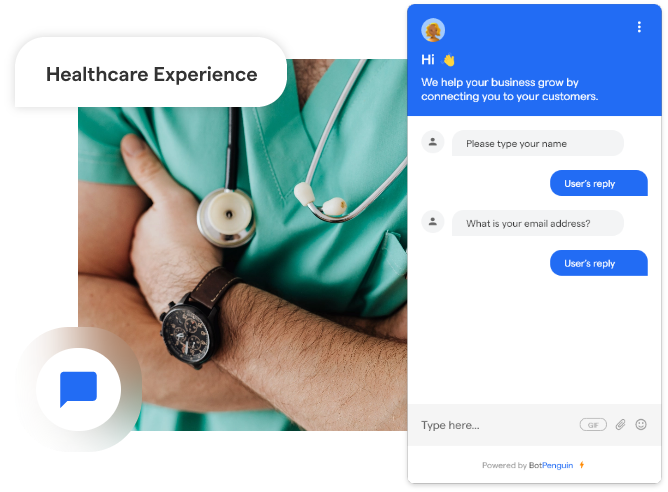
When it comes to patient communication, WhatsApp for Healthcare offers many features that can greatly improve the overall experience for both patients and healthcare providers.
- Transmit Test Results Securely
Gone are the days of relying on traditional methods to deliver test results.
With the use of WhatsApp for healthcare, you can securely transmit test results to patients, ensuring they receive the information they need in a timely and efficient manner.
- Schedule and Confirm Appointments
When it comes to making appointments, WhatsApp can change the way.
The app makes it simple for medical staff to plan and confirm patient appointments, which lowers the possibility of misunderstandings or missed appointments.
- Provide Medication Reminders
Medication adherence is crucial for successful treatment outcomes. WhatsApp can send medication reminders to patients, ensuring they never miss a dose. This simple and convenient feature can significantly improve patient compliance and overall health.
2. Facilitate Collaborative Care
Collaboration among healthcare providers is important for delivering comprehensive care to patients.
WhatsApp for healthcare offers several features that can enhance collaborative efforts within the healthcare team.
- Organize and Participate in Group Chats
WhatsApp's group chat feature allows healthcare providers to create dedicated groups for multidisciplinary teams involved in patient care.
This facilitates seamless communication, enabling everyone involved to stay updated and informed.
- Coordinate Care Between Healthcare Providers
Doctors can use WhatsApp for healthcare to coordinate with other providers involved in a patient's treatment plan.
Whether discussing treatment options or sharing patient updates, the app offers a convenient platform for collaboration and quick decision-making.
- Share Relevant Research and Articles
WhatsApp for healthcare can serve as a valuable platform for knowledge sharing among healthcare professionals.
Whether it's sharing the latest research papers or articles relevant to a specific medical condition, the app enables healthcare providers to exchange valuable insights and stay informed.
3. Improve Remote Patient Monitoring
The advent of telemedicine has changed healthcare delivery, and WhatsApp can play a crucial role in improving remote patient monitoring efforts.
- Use Voice and Video Calls for Telemedicine
WhatsApp's voice and video calling capabilities allow healthcare providers to conduct virtual appointments with patients.
This is particularly useful for follow-up consultations, minor health concerns, or initial assessments that don't require in-person visits.
- Monitor Patients' Vitals and Symptoms in Real-Time
By integrating remote monitoring devices with WhatsApp, healthcare providers can receive real-time updates on patients' vital signs and symptoms.
This allows for proactive interventions and timely adjustments to treatment plans, improving patient outcomes.
- Facilitate Remote Patient Counseling
Mental health counseling, lifestyle coaching, and patient education can be seamlessly conducted through WhatsApp for healthcare.
Healthcare providers can engage with patients remotely, providing support and guidance when needed.
4. Strengthen Employee Communication
Clear and effective communication among healthcare teams is important for delivering optimal care.
WhatsApp in healthcare can be a useful tool for enhancing employee communication and fostering a collaborative work environment.
- Share Important Updates and Announcements
WhatsApp groups can be created to facilitate the dissemination of important updates and announcements to all staff members. Whether sharing policy changes, new protocols, or news about the healthcare organization, WhatsApp ensures everyone is informed in real-time.
- Conduct Virtual Meetings and Training Sessions
WhatsApp's voice and video call features are not only useful for patient consultations but also for conducting virtual meetings and training sessions with employees.
This saves time and resources by eliminating the need for everyone to be physically present in the exact location.
- Foster Teamwork and Collaboration
With WhatsApp, healthcare professionals can easily engage in group chats, allowing seamless teamwork and collaboration.
This promotes a sense of unity and camaraderie among team members, enabling them to work together more efficiently and effectively.
Suggested Reading:
5. Improve Privacy and Security of Data
Data security and privacy are main issues in the healthcare sector. There are many capabilities offered by WhatsApp that can help healthcare practitioners in protecting patient privacy and security.
- Put End-to-End encryption in place
Because WhatsApp uses end-to-end encryption, messages and attachments are only accessible by the sender and the receiver.
This adds the next level of protection by preventing unwanted access to sensitive patient data.
- Establish Secure User Authentication
By enabling two-step verification, healthcare organizations can enhance the security of their WhatsApp accounts.
This adds an extra level of protection, requiring a unique passcode to be entered before accessing the account.
- Follow HIPAA Regulations for Patient Data Protection
Healthcare providers must always adhere to HIPAA regulations to protect patient data privacy.
While WhatsApp is not officially HIPAA-compliant, healthcare organizations can implement policies and protocols to ensure patient information shared on the platform adheres to HIPAA guidelines.
6. Utilize Chatbots for Quick Responses
Chatbots have changed customer service, and the healthcare industry is no exception.
Using WhatsApp for healthcare allows healthcare organizations to leverage chatbots to provide quick responses and streamline patient interactions.
- Develop Chatbots for Common Inquiries
By creating chatbots, healthcare providers can automate responses to common patient inquiries, such as clinic hours, location, or general health information.
This frees staff time, allowing them to focus on more complex tasks.
- Provide Automated Appointment Scheduling
WhatsApp chatbots can be programmed to assist patients with scheduling appointments.
By integrating with existing appointment systems, patients can find available slots and book appointments without manual intervention.
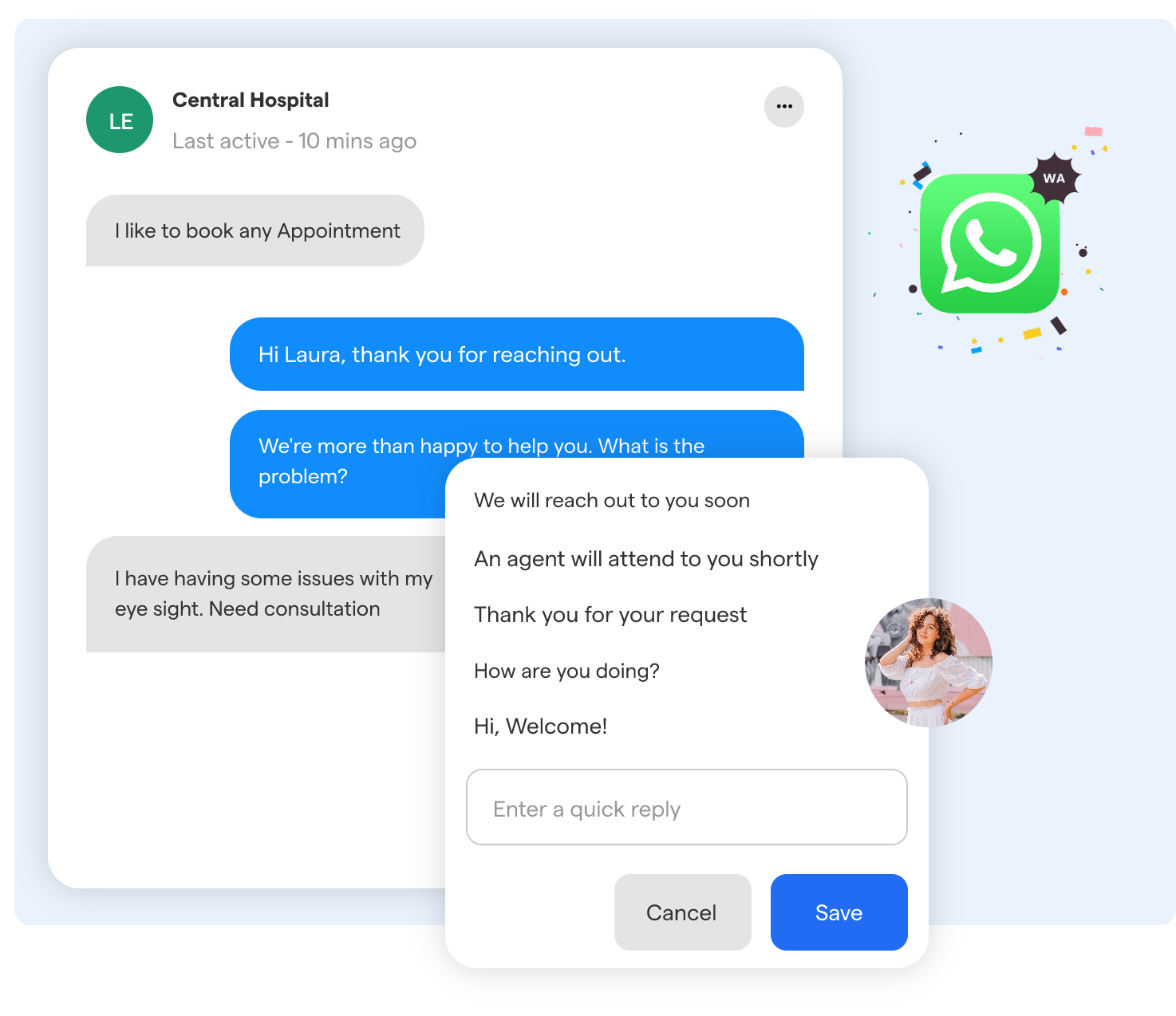
- Offer Symptom Checker Services
The use of WhatsApp for healthcare can also offer symptom checker services, allowing patients to input their symptoms and receive preliminary advice or guidance.
This can help patients make informed decisions about seeking further medical attention.
Chatbots play an important role in automating healthcare’s administrative tasks. And, appointment scheduling is just a fraction of the whole automation process that healthcare chatbots can provide.
For example, opting for BotPenguin is a real gold rush of features. From automating the lead generation process to customer support automation, from answering patient queries to providing medication reminders, BotPenguin's Chatbots have too much to offer.
And for the sweet dish, deploy a chatbot with all these features on the platform of your choice:
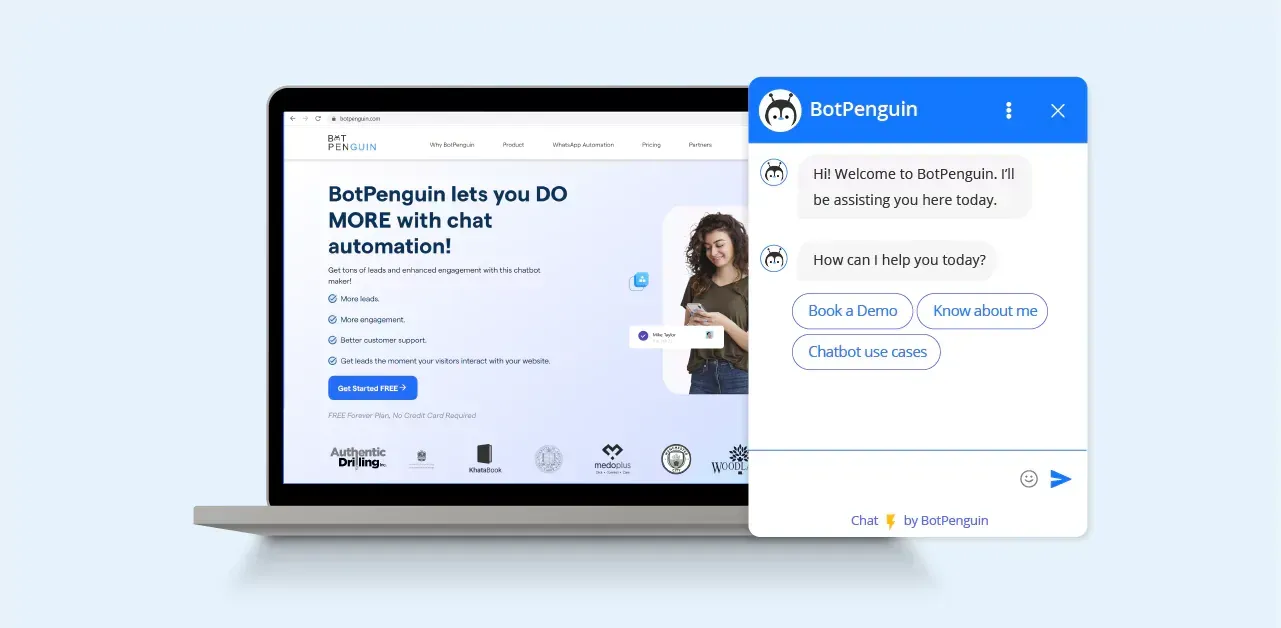
7. Streamline Administrative Tasks
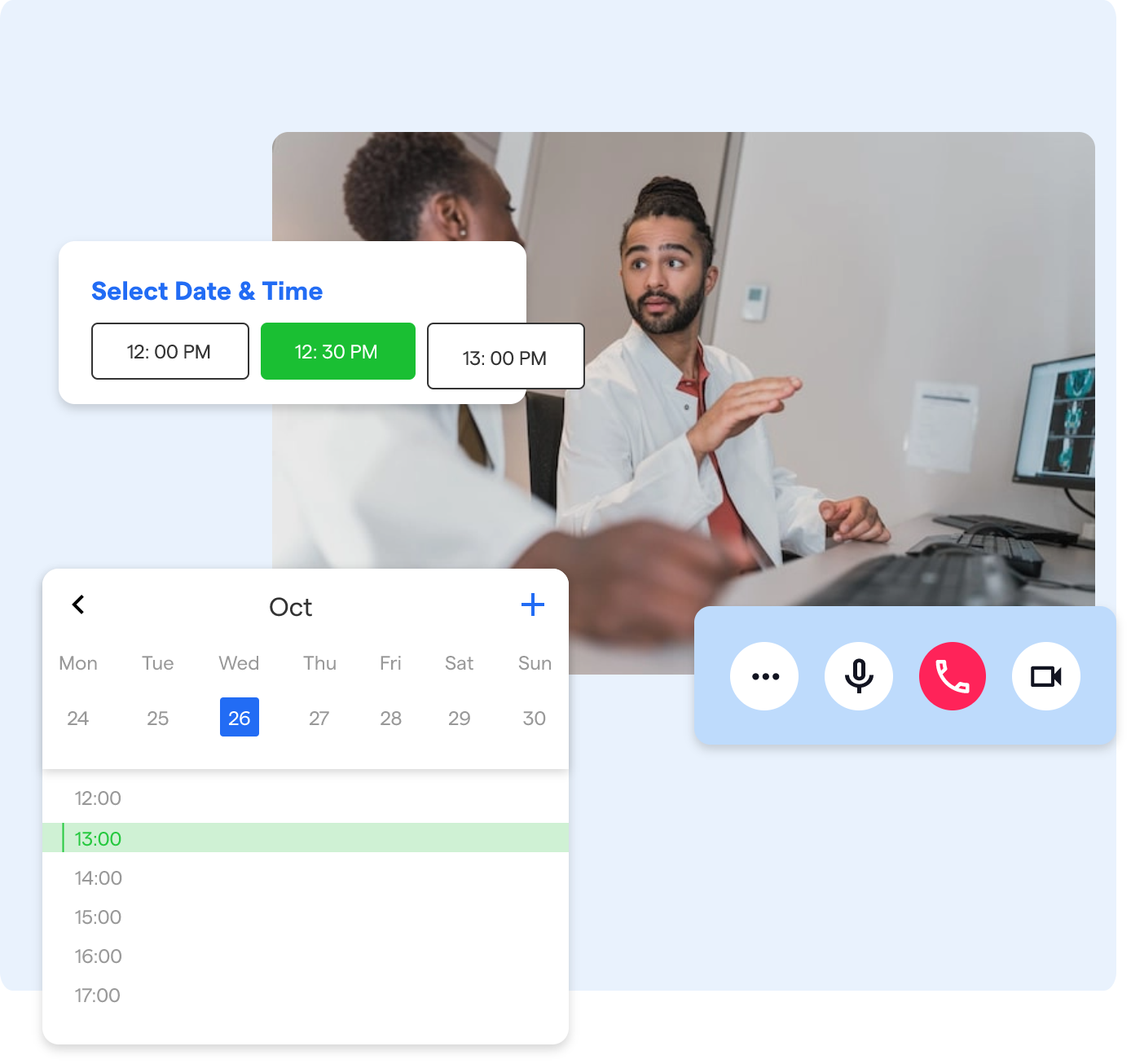
Healthcare administrative job management can be labor- and time-intensive. WhatsApp for healthcare, however, provides tools to assist these procedures to go more smoothly and with less resource use.
- Process Appointment Bookings and Cancellations
It might be difficult to handle appointment requests and cancellations over the phone or via email.
A quick and easy way for patients to make, change, or cancel appointments is using WhatsApp.
Patients may easily and quickly manage their appointments, saving time and lowering administrative stress by texting the healthcare practitioner.
- Manage Patient Records and Documentation
Keeping patient records and documentation organized is crucial for healthcare providers.
WhatsApp for healthcare can be a centralized platform where healthcare professionals can securely send and receive patient records, test results, medical images, and other important documents.
This facilitates efficient collaboration among healthcare teams and ensures that essential information is readily accessible when needed.
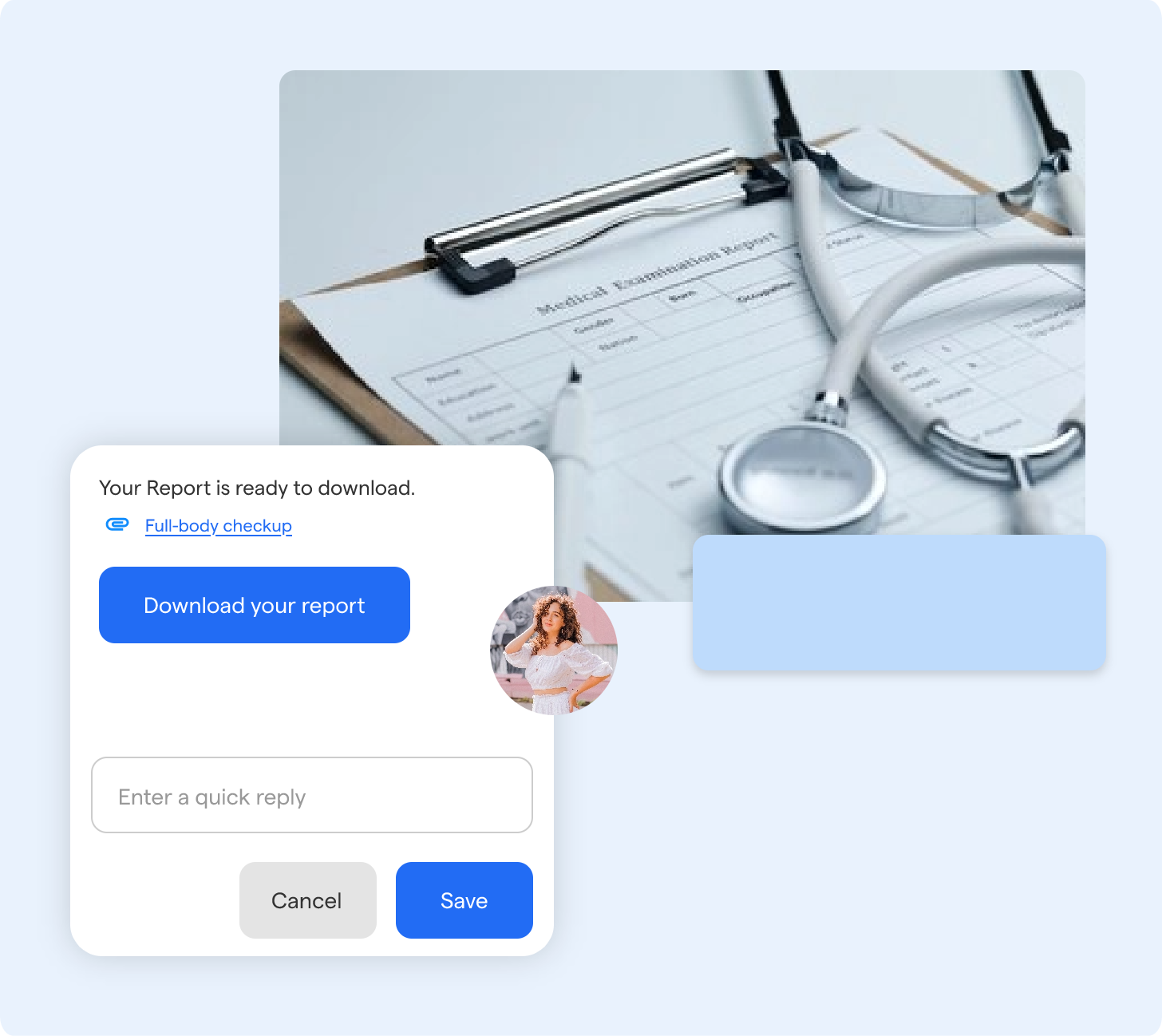
- Access Billing and Payment Information
Moreover, WhatsApp for Healthcare can help with payment and billing information management.
A smooth and simple payment procedure is made possible by healthcare providers' ability to send patients bills and payment reminders securely.
Furthermore, patients may use WhatsApp to immediately submit payment queries or ask questions about their billing status, eliminating the need for drawn-out phone calls or in-person consultations.
Suggested Reading:
8. Educate and Empower Patients
Patient education and empowerment are vital in promoting better health outcomes. WhatsApp offers healthcare providers a direct and interactive way to engage with patients, providing them with valuable information and resources.
- Share Educational Materials and Videos
Using WhatsApp for healthcare, multimedia capabilities can be enhanced, healthcare providers can share educational materials, such as brochures, infographics, and videos, directly with patients.
These resources can cover various topics, from disease prevention to treatment options, empowering patients with knowledge and encouraging proactive healthcare management.
- Provide Self-Care Tips and Recommendations
WhatsApp for healthcare allows providers to send tailored self-care tips and recommendations to patients.
Whether it's reminders to take medications, follow specific dietary guidelines, or exercise regularly, these personalized messages can motivate patients to adopt healthier lifestyles and actively participate in their healthcare journey.
- Foster Patient Engagement and Participation
Patient engagement is crucial for successful healthcare outcomes.
WhatsApp provides a platform for healthcare providers to foster engagement by creating patient support groups where individuals facing similar health conditions can connect, share experiences, and offer support.
Additionally, healthcare professionals can use WhatsApp to conduct patient surveys and collect feedback, gaining valuable insights to inform service enhancements and improve patient satisfaction.
9. Use Broadcast Lists for Mass Communication
WhatsApp Broadcast Lists feature is a game-changer for mass communication within healthcare organizations
This feature enables healthcare providers to disseminate important announcements efficiently, share healthcare campaigns and initiatives, and gather feedback from many recipients.
- Send Important Announcements and Alerts
WhatsApp Broadcast Lists allow healthcare providers to reach a large audience with important announcements and time-sensitive alerts.
Whether notifying staff about policy changes or informing patients about upcoming events or clinic closures, healthcare organizations can ensure that crucial information is communicated promptly and effectively.
- Share Healthcare Campaigns and Initiatives
Using WhatsApp's Broadcast Lists, healthcare providers can promote healthcare campaigns and initiatives to a targeted audience.
This could include raising awareness about a particular health issue, encouraging preventive care, or disseminating information about community health events.
The personalized nature of WhatsApp messages helps enhance campaign effectiveness and engagement.
- Conduct Patient Surveys and Feedback Collection
WhatsApp's Broadcast Lists can also be used to conduct patient surveys and collect feedback from various individuals.
By sending out surveys to specific groups or the entire patient population, healthcare providers can gain valuable insights into patient satisfaction, service improvements, and areas for enhancement.
This feedback can inform decision-making and drive continuous improvement initiatives.
Suggested Reading:
Top 5 Reasons why BotPenguin is the Best Healthcare Chatbot available
10. Enhance Follow-up Care and Support
Follow-up care and support are essential to ensure that patients maintain good health outcomes.
WhatsApp can facilitate seamless follow-up care with patients and provide them with the support they need.
- Schedule Follow-up Appointments Seamlessly
Scheduling follow-up appointments can often be a daunting task, especially when communicating through phone calls, emails, or in-person visits.
With WhatsApp, healthcare providers can quickly and easily schedule patient appointments, reducing the need for lengthy conversations or in-person visits.
- Offer Post-Treatment Guidance and Support
Post-treatment guidance and support play a significant role in promoting good health outcomes.
Healthcare professionals can use WhatsApp to provide post-treatment guidance, answer questions, and support patients.
By providing patients with the necessary information and support, healthcare providers can help patients navigate their recovery and empower them to take charge of their health.
- Provide Medication Adherence Reminders
One of the most significant challenges in healthcare is medication adherence.
Healthcare providers can use WhatsApp to send medication adherence reminders to patients, ensuring they take their medications as prescribed.
By providing these reminders, healthcare providers can improve medication adherence rates and prevent potential health complications.
11. Collaborate with Healthcare Organizations
Collaboration with healthcare organizations and professionals is crucial for enhancing healthcare outcomes.
WhatsApp for healthcare can be used as a collaborative platform to connect with other healthcare organizations, network with other healthcare professionals, seek advice and second opinions, and share best practices.
- Network with Other Healthcare Professionals
Healthcare professionals can use WhatsApp to network and collaborate with other healthcare professionals.
This allows for exchanging ideas, experiences, and knowledge and fosters community among healthcare professionals.
- Seek Advice and Second Opinions
The use of WhatsApp for healthcare platforms provides advice and second opinions from other healthcare professionals.
This can be especially helpful in complex cases that require a multidisciplinary approach.
By seeking advice and second opinions, healthcare providers can ensure that their patients receive the best possible care.
- Share Best Practices and Learn from Others
Healthcare organizations and professionals can use WhatsApp to share best practices and learn from others.
This allows for the dissemination of knowledge and ideas and can help improve healthcare outcomes.
By sharing best practices and learning from others, healthcare providers can stay up-to-date with the latest trends and advancements and provide the best possible care to their patients.
Conclusion
WhatsApp for healthcare offers numerous benefits for optimizing your practice. Its versatile features allow streamlining tasks, educating patients, enhancing follow-up care, collaborating with other organizations, and mass communication - all of which improve efficiency, patient care, and relationships.
Simplify patient care further with BotPenguin's AI-powered chatbot integrated with WhatsApp!
The chatbot streamlines appointment booking, collects feedback, and answers common queries 24/7 within the WhatsApp platform patients already use.
Patients can check doctor availability, get medical advice, and raise service requests anytime from WhatsApp.
Healthcare providers save costs while boosting satisfaction. The intuitive bot improves efficiency by handling level-1 queries on WhatsApp, freeing up staff to focus on complex cases.
By harnessing WhatsApp's power and BotPenguin's chatbot capabilities, you can revolutionize healthcare communication and provide better outcomes.
Try incorporating BotPenguin's chatbot into your WhatsApp-based healthcare services today for seamless, personalized care at your patients' fingertips!
Frequently Asked Questions (FAQs)
How can WhatsApp be used to facilitate remote patient consultations?
Utilize WhatsApp's video call feature for virtual appointments, enabling healthcare professionals to conduct remote consultations, provide medical advice, and monitor patient progress. Ensure compliance with privacy regulations and maintain secure communication to safeguard patient confidentiality.
What are the benefits of using WhatsApp for patient appointment scheduling?
WhatsApp for Healthcare simplifies the appointment scheduling process, allowing patients to book appointments conveniently. Implement automated appointment reminders, real-time updates, and seamless communication to reduce no-shows and improve overall appointment management efficiency in healthcare facilities.
How can WhatsApp enhance patient engagement and education in healthcare?
The use of WhatsApp for healthcare is to share educational materials, health tips, and informative content to promote patient engagement and health literacy. Establish patient support groups, provide personalized health information, and foster patient empowerment through interactive and informative messaging.
What security measures should be considered when using WhatsApp for healthcare communication?
Ensure compliance with data protection laws and regulations and use end-to-end encryption to secure patient data and maintain confidentiality. Implement secure authentication procedures, access controls, and data backup protocols to protect sensitive healthcare information from unauthorized access and data breaches




